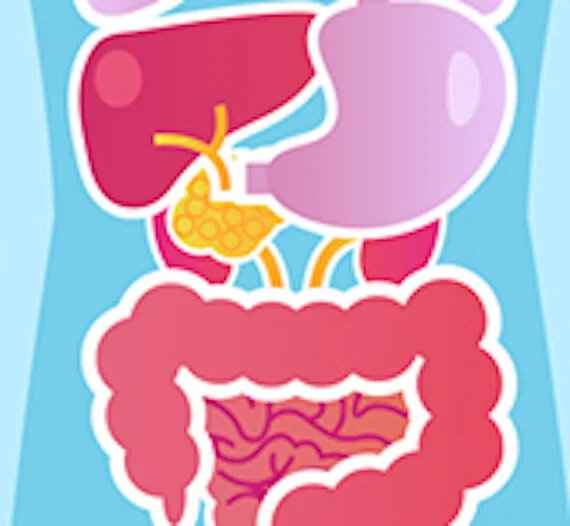I chew my food to make it mushy.
I swallow the mushy food.
It gets more mushed up inside my stomach and guts.
Some of the food helps my body grow.
The waste bits get pushed out of my body
Our body must digest (say die-jest) food we have eaten. The parts of the body that do this and the process is called the digestive system.
When we chew, food is crushed up and mixed with saliva (spit) so it becomes mushy. It has to be broken down like this so that the blood can absorb the nutrients (the goodness in food) and carry it around the body.
We swallow the mush and it travels through a long tube that runs from the mouth called the esophagus (say ee-sof-a-gus), and goes into the stomach.
Inside the stomach there are juices that mix the food until it looks like thick soup.
Next, the food goes into a long tube all folded up inside the body. It is called the small intestine. Juices from the liver mush up the food even more, and good things from the food go into the blood, which takes them to parts of the body where they are needed.
The good things from the food are the vitamins and minerals.
The food then goes to the large intestine. Water from the food goes into the blood. By now, the body has taken all the things it needs from the food. What is left is waste that is not needed by the body. It gets stored at the end of the large intestine inside the rectum.
The waste must leave or the body will get sick. Muscles push the waste (poo) out of the body through the anus, which is the opening in your bottom.
How long does it take for the body to digest food?
Food can be 3-4 hours in the stomach, then about 3 more hours as it moves through the intestine. It can stay in the the large intestine for up to 36 hours. So, depending on the type of food and the speed at which it moves, it can take about 40 hours or more.
Read more about the digestive system:
https://www.natgeokids.com/au/discover/science/general-science/digestive-system/
Watch a video about the Digestive System:
http://www.neok12.com/video/Digestive-System/zX57757c6c561f6b5b5d7a59.htm
The liver also plays an important role in the digestive process
Where is it?
The liver, a dark reddish-brown organ, is in the abdomen on top of the stomach, the right kidney, and the intestines, mostly behind the ribs.
What does it do?
The liver makes a substance called bile. Bile helps to break down fats during digestion so that they can be absorbed into the blood.
The liver also processes blood that flows to it from the stomach and intestines. It breaks down the nutrients from food that have moved into the blood during digestion. This makes it easier for the body to use the nutrients (nutrients are proteins, minerals, carbohydrates and vitamins that the body gets from food).
Other things that the liver does
The bile that the liver makes helps to carry away wastes.
The liver makes proteins for blood plasma.
It stores excess blood sugar or glucose, and stores the mineral iron. The extra glucose and iron can be used later when the body needs them.
The liver filters and cleans the blood of drugs and other poisons such as alcohol.
By removing bacteria (germs) from blood, the liver helps to protect the body from infections.
The liver changes the medicines we take so that the body can absorb and use them to make us better.
The liver can be damaged by the hepatitis virus and by alcohol which stop it from working as it should.



